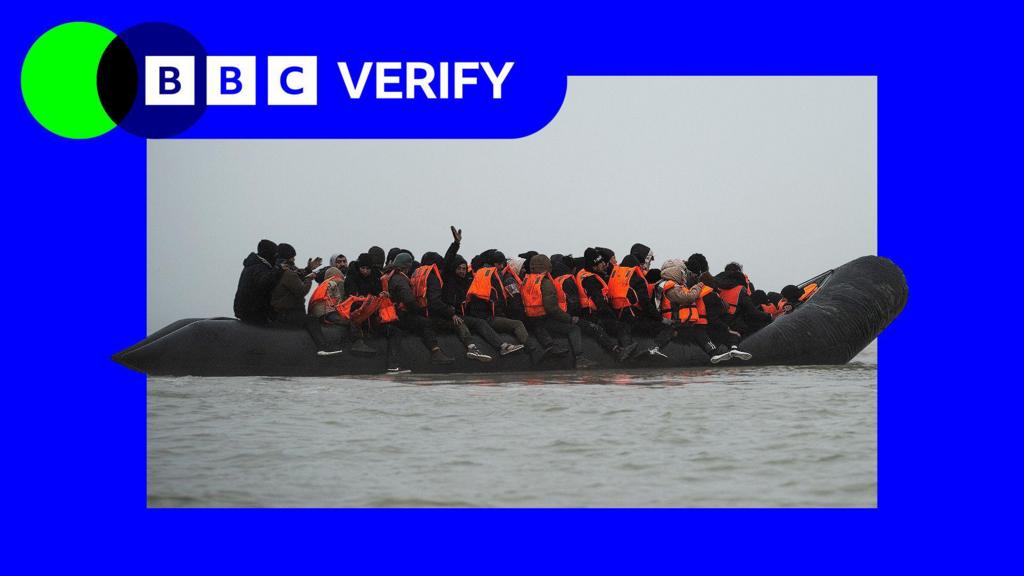Addressing illegal immigration and reforming the asylum system are top priorities for the current government.
The opposition leader has pledged to dismantle criminal networks facilitating illegal immigration, echoing previous government commitments to deter arrivals by sea.
BBC Verify examines key government pledges, including curbing small-boat crossings, phasing out asylum hotels, and increasing the repatriation of individuals lacking legal residency.
The asylum process determines eligibility for UK residency based on well-founded fears of persecution in one’s home country.
As of June 16th, 2025, 16,545 individuals arrived via small boats—a nearly 33% increase from the same period last year.
To reduce crossings, the government aims to disrupt the criminal organizations involved.
However, the government’s progress metrics and timeline remain unclear.
The Home Office stated that data on actions against criminal gangs is being compiled and may be released later.
Information exists regarding French authorities’ efforts to prevent crossings—supported by a £476m, three-year UK agreement (2023).
Approximately 24,791 crossings were reportedly prevented between July 2024 and May 2025. The subsequent actions and potential repeat attempts remain unknown.
High-profile convictions of UK-based smugglers, including one individual involved in smuggling over 3,000 people, and continental raids have been reported.
Recent UK-EU summit discussions resulted in a joint pledge to address illegal immigration collaboratively.
This encompasses arrivals via small boats, concealed transport, and visa overstays.
The vast majority of UK immigration is legal, encompassing work permits, student visas, asylum claims, and other authorized pathways.
Approximately 44,000 individuals entered the UK illegally in the past year—roughly 5% of the nearly one million immigrants between April 2024 and March 2025.
Labour pledged to “eliminate asylum hotels, saving billions in taxpayer funds” in its manifesto, reaffirmed in the recent Spending Review.
The government targets 2029 for this objective.
However, recent data reveals an increase in asylum seekers housed in hotels between June 2024 and March 2025.
Hotel occupancy rose from 29,585 to 32,345 during this period.
While precise hotel numbers are not regularly released, BBC Verify data shows a rise from 212 in July to 218 in December.
Asylum applicants receive legal protections, including accommodation if needed, pending a decision.
Most small-boat arrivals claim asylum—constituting a third of all claims in the past year. Visa overstays comprise another significant portion.
Since 2020, hotel reliance has increased, partly due to insufficient alternative accommodation for the influx of small-boat arrivals.
Asylum hotel costs are substantial—reaching £8m daily in 2023-24. The government has implemented cost-saving measures by increasing room occupancy.
The government also committed to “clearing the asylum backlog“.
This refers to pending asylum claims awaiting decisions on refugee status and UK residency.
A 58% increase in asylum case decisions since last summer, coupled with a recent drop in applications, has reduced the overall backlog compared to June 2024.
Labour’s approval rate for asylum claims stood at 40% between January and March 2025.
Another backlog involves court appeals following rejected asylum claims, which has worsened since the election, reaching a record high of nearly 51,000 in March 2025.
The government also pledged to increase returns of individuals without legal residency, establishing a new unit with 1,000 additional staff.
Between July 2024 and May 2025, the Home Office recorded 29,867 returns, a 12% increase year-on-year.
However, only 7,893 involved enforced removals. 8,511 failed asylum seekers were returned; the breakdown of voluntary versus enforced returns remains unclear.
Data from January to March reveals that many voluntary departures occurred without government assistance or knowledge, as previously noted by BBC Verify.
This contradicts ministerial claims of numerous “removals” or “deportations”.
The Home Office attributes all return outcomes to departmental efforts.
Suggest topics for BBC Verify investigation.
Newcastle’s Karen Kilgour advocates for greater local control over asylum seeker housing.
Refugees in Hampshire and Dorset build community through football.
Government contractor Mears announces a three-month moratorium on new asylum seeker housing purchases.
Hull residents learn about the challenges faced by asylum seekers during Refugee Week.
Ukrainian refugee Inna Prykhodko works to welcome displaced individuals.

